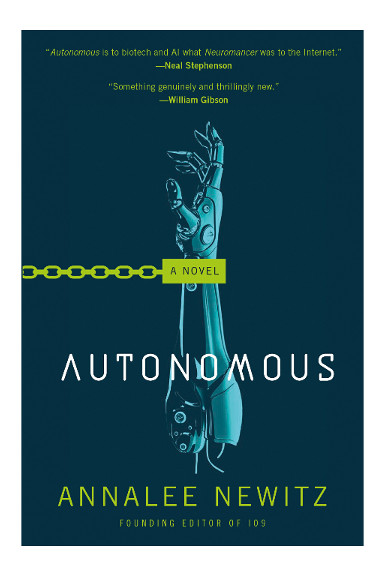
The novel “Autonomous” by Annalee Newitz was published for the first time in 2017.
Judith “Jack” Chen was able to pirate Zacuity, a new drug that has yet to be officially launched on the market, creating a low-cost version. However, people who tried it soon start suffering from very serious side effects. Jack realizes that her pirate version of Zacuity has the same effects as the official drug, which means that the pharmaceutical company that developed it must be aware of its side effects.
Agent Eliasz is following in Jack’s tracks with the assistance of the robot Paladin. The two of them will stop at nothing to capture Jack, whom Eliasz considers a terrorist. Their mission leads them to infiltrate an anti-patent group with the need to cover each other’s back, a situation that will strengthen their bond in an unexpected way.
“Autonomous” begins in 2144 in a future where robots are so sophisticated that their differences with human beings have narrowed considerably. On the other hand, that happened also because during the more than a century that separates us from that future, humans lost part of their individual autonomy and in particular the chances to make life choices.
Robots but also some humans are born having already an indenture contract with a company and can get out only if they can make enough money. For humans it’s also possible to voluntarily sign an indenture contract. There’s also the possibility that a contract is transferred to another company because in the end in that future corporations decide the fate of ordinary people.
In this situation Annalee Newitz develops a story that mixes the cyberpunk, although updated with the technological progress of the mid-222nd century, and biopunk subgenres, with the plot linked to drug piracy centered around the anti-patent protagonist Jack Chen. “Autonomous” contains several references to patents, licenses, contracts and the like so, even if it never gets into the most technical details, it’s easier to follow the novel if you already have some basic knowledge of these subjects.
Understanding the various subjects addressed in “Autonomous” is important because it’s a sophisticated novel that develops a number of themes intertwined in various ways. Understanding the problems related to indenture contracts and those connected to drug patents is useful first of all to assess the similarities of the future described by Annalee Newitz with the present but also the other ethical and moral elements.
The future depicted in “Autonomous” is complex and this means first of all that reading the blurb you can get the idea that Jack Chen is a kind of future Robin Hood bad agents who defend the interests of Big Pharma are hunting but the story is not exactly like that. The novel is full of shades of gray also regarding ethics and morality with characters that offer different positions.
Plot and characters are also used to develop other themes ranging from free will to sexuality, again intertwined in ways that can be complex. Perhaps Annalee Newitz tried to include too many themes in a novel that’s not very long and at least some of them haven’t been fully developed. The characters’ development ends up being a little sacrificed too.
Eliasz and Paladin are the main example of the problem. Their relationship changes in a way that seems sudden in a part of the plot that would have been better if in particular Eliasz had a greater depth to understand his motivations and his evolution. Paladin, when not focused on his work, is used above all to show how robots are the mirror of human sexual tendencies and how in that future discriminations are unfortunately still the same that exist today. These are other subjects that could’ve been developed more.
Perhaps “Autonomous” could have been longer to offer that kind of development but in these cases there’s also the risk of burdening an already complex novel. Another possibility is that Annalee Newitz writes more stories – either sequels or independent stories – set in a future that offers many ideas.
“Autonomous” isn’t perfect but I appreciate Annalee Newitz’s ambition to create that future, sometimes even brutally, without trying to soften its bad things. The society of that future, leaving outi ts robots, has similarities with ours in ways that can be disturbing and there are no magic spells to eliminate its flaws. Overall, I find that the novel’s merits far overweigh its flaws and is really thought provoking so I recommend reading it.

